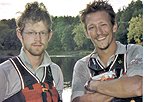To look at 23-year-old Josh Evans, a Jackson native and Jackson Academy graduate, is to look at an artist, an intellectual, a man with scruffy stubble who fits in well with the aesthetics of the Fondren district. Evans' counterpart is the aptly named Dallis Ketchum. Ketchum, 25, and a native of Memphis, is also a thinker. But unlike Evans, he is lively, considerably animated in conversation, tan and clean-shaven. On the surface, there are few similarities between the two; however, on Sept. 3, three days after Hurricane Katrina's catastrophic landfall and trek up from the Gulf of Mexico, this unlikely duo joined forces in a kayak to battle the most formidable of foes: the monstrous, 2,300-mile Mississippi River.
The inspiration for the trip came in 2004, while Evans and Ketchum were enrolled at the University of Mississippi and living together in Oxford. At the time, the two spent many a weekend canoeing down the Tallahatchie River with friends, all the while growing fond of being on the water. One night on the river, Ketchum revealed his future plans concerning the mighty Mississippi to his roommate. Evans, who admittedly is anything but an experienced outdoorsman, was naturally a bit reluctant to join at first. He soon warmed up to the idea, though, after reading "Mississippi Solo," a chronicle of author Eddie Harris' travels on the Mississippi. Evans recalls, "About a week later … I finished the last sentence, called Dallis, and was like 'I'm in. I've got to do this.'"
About a year later, following their graduation from Ole Miss, the two set off to the source of the nation's second longest river, Minnesota's Lake Itasca. After a less-than-spectacular put-in, Evans and Ketchum paddled nearly 18 days before reaching Minneapolis.
The reason for the sluggish start, Ketchum says, was the vast wetland that they met early on in their travels: "It's kind of like a desert of water. There's no current; there's no guide who can tell you how to get through it. … There are no points of reference on the horizon, and a compass won't help you."
After clearing a particularly difficult portion of the bog Rice Lake, the pair stumbled upon a bit of good fortune—finding some friendly strangers and much-needed maps—that put them well ahead on their liquid path to success. After 23 days, Evans and Ketchum were out of Minnesota.
For the greater part of the rest of the trip, Evans and Ketchum continued to receive the graces of strangers and fellow travelers alike, which, coupled with the broad passages of the river that begin after Minneapolis, led to some tremendously smoother sailing. This trend continued until the two reached Louisiana.
In Louisiana, the river's traffic was severely congested. This was in part due to the aftermath of Katrina. Over the course of their final three days on the Mississippi, Evans and Ketchum faced very arduous physical conditions. Dodging large sea craft and sometimes paddling for up to 13 hours in a day, the pair feared they might not finish their trip on schedule. But they reached their final destination at the port of New Orleans right on time, some 56 days from their starting date. From there, they met up with Evans' brother, who whisked them away to a congratulatory party.
Now roommates in Belhaven, Evans and Ketchum still reminisce on their remarkable voyage. They express awe at their total detachment from familiarity, and both insist that it will be quite a while before they can fully grasp the significance of their trip.
In the meantime, the pair looks forward to life in Jackson. Ketchum, who moved to Jackson to take a job in real estate, says that he is "dead set on being involved in town." Evans notes the "new vibe" of the city's art scene and delights in the fact that "everyone seems to be coming back to Jackson."
When asked about a possible return trip down the Mississippi, Evans pauses, smiles and says, "Yeah, it was fun. … (I'll) probably never do it again." "Yeah, me either," Ketchum adds.



Comments
Use the comment form below to begin a discussion about this content.
comments powered by Disqus